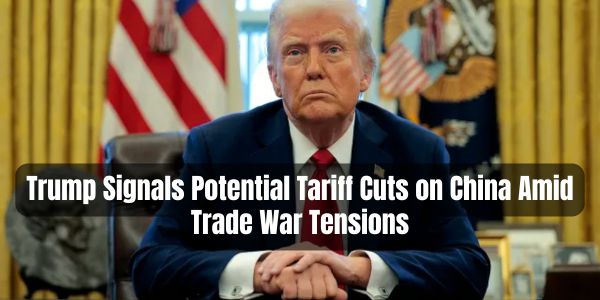President Donald Trump has hinted at a potential de-escalation in the ongoing trade war with China, suggesting that the current 145% tariffs on Chinese goods could be significantly reduced. Speaking to reporters at the White House, Trump acknowledged that the tariffs are “very high” and stated they would “come down substantially” as part of negotiations with Beijing, though he emphasized they “won’t be zero.”
A Shift in Strategy
According to reports from the Wall Street Journal, the Trump administration is considering slashing tariffs to a range of 50% to 65%, with a tiered approach that would impose lower levies of 35% on items not deemed a threat to national security and up to 100% on goods critical to U.S. interests. This move comes after months of escalating trade tensions, with China retaliating by imposing 125% tariffs on U.S. goods, leading to fears of a global recession.
Treasury Secretary Scott Bessent has described the current tariff levels as “unsustainable,” stressing that mutual reductions are necessary for formal trade talks to begin. However, Bessent and White House spokesperson Karoline Leavitt have clarified that the U.S. will not unilaterally lower tariffs, signaling that any cuts would depend on reciprocal actions from China.
Must Read: India Imposes 12% Duty on Steel Imports to Protect Domestic Industry
Mixed Signals and Market Reactions
The prospect of tariff reductions sparked optimism in global markets, with the S&P 500 and Nasdaq rising 1.67% and 2.50%, respectively, on April 23. However, markets pulled back the following day amid conflicting signals from the administration and China’s foreign ministry, which dismissed claims of active tariff talks as “fake news.” This contradiction has raised questions about the status of negotiations, with some analysts suggesting Beijing is waiting for a more respectful approach from Washington.
In a further sign of softening, the Financial Times reported that the Trump administration is considering exemptions for Chinese auto parts from certain tariffs, a move that could benefit automakers like Ford, GM, and Tesla. These exemptions are seen as an effort to mitigate the impact of tariffs on American supply chains, which have driven up costs for businesses and consumers alike.
Domestic and International Pressures
Trump’s shift in tone may reflect mounting domestic pressures, including inflation concerns and disruptions to U.S. supply chains. A group of 12 U.S. states, including New York and Illinois, has filed a lawsuit challenging the president’s authority to impose tariffs without congressional approval. Internationally, the trade war has rattled allies, with the European Union threatening countertariffs if no deal is reached by July 9.
While Trump remains confident in his bargaining position, analysts argue that the high tariffs have not yielded the desired concessions from China, which has instead restricted U.S. services exports and imposed controls on rare earth materials critical to high-tech industries. The International Monetary Fund has also warned of a potential global recession, citing the U.S.-China trade standoff as a key driver.
Must Read: Twelve States Sue Trump Administration Over Tariff Policies
What Lies Ahead?
As the Trump administration navigates these complex negotiations, the world watches closely. The president has indicated that new tariff rates could be announced in the coming weeks, depending on the outcome of talks with China and other trading partners. For now, the possibility of tariff cuts offers a glimmer of hope for de-escalation, but the path to a stable trade relationship remains uncertain.
Stay tuned to TheInterviewTimes.com for the latest updates on this developing story.

